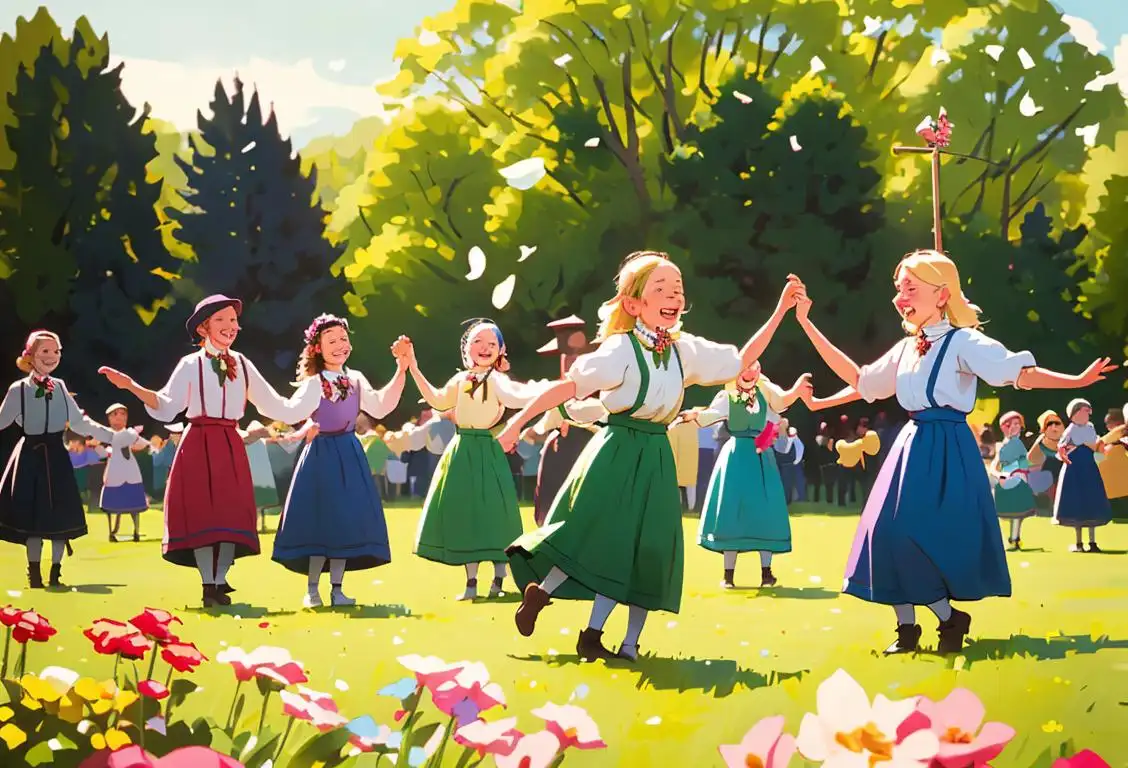National Swedish Day

Welcome to the wacky world of National Swedish Day! Prepare yourself for a delightful journey filled with Swedish meatballs, ABBA tunes, and perhaps the occasional visit from the Swedish Chef. Let's dive in and explore the fascinating history behind this special day.
When is Swedish Day?
It's national swedish day on the 6th June.
The Internet Origins of National Swedish Day
Believe it or not, National Swedish Day actually originated on the internet. It all started when a group of Swedish enthusiasts decided to celebrate their love for all things Swedish in the digital realm. They created a hashtag, #SwedishPride, and soon people from all corners of the web joined in the festivities. The trend grew, and in no time, National Swedish Day was born.
This online celebration quickly spread beyond the virtual world as people across the globe started hosting Swedish-themed parties, indulging in Swedish delicacies, and even learning a few Swedish phrases. It became a day to honor Swedish culture, traditions, and the country that gave us ABBA, Ikea, and those infamous meatballs.
The Actual National History of Swedish Day
While National Swedish Day may have its roots in cyberspace, the country of Sweden also has a rich history of celebrating its national pride. The official National Day of Sweden is celebrated on June 6th, and it marks the day when Gustav Vasa was crowned as King of Sweden in 1523. It is a day filled with flag-waving, parades, concerts, and gatherings where people come together to celebrate their Swedish heritage.
On this special day, the streets of Sweden come alive with festivities. People don traditional costumes, dance around maypoles, and enjoy an array of delicious Swedish cuisine, from herring to lingonberry jam. It's a day of Swedish pride, unity, and a whole lot of fun.
History behind the term 'Swedish'
1626
The Birth of Sweden
In 1626, the term 'Swedish' emerged as the adjective form of Sweden, a country located in Northern Europe. The term originated from the Old English word 'Sweoðeod,' which referred to the people of Sweden. Sweden, known for its rich history and vibrant culture, played a significant role in shaping the term 'Swedish' and making it synonymous with their national identity.
1751
The Swedish Language
During the 18th century, the term 'Swedish' took on new significance as it became associated with the Swedish language. Swedish, a North Germanic language, developed from Old Norse and is spoken by approximately 10 million people worldwide. The Swedish language gained recognition as a distinct linguistic entity, reflecting the unique cultural heritage of Sweden.
1800s
Swedish Cuisine and Lifestyle
In the 19th century, the term 'Swedish' expanded its domain to encompass Swedish cuisine and lifestyle. Swedish cuisine combines traditional practices with modern influences, featuring dishes like meatballs, herring, and lingonberry jam. Additionally, Sweden's minimalist design philosophy and commitment to sustainability made 'Swedish' synonymous with elegance and simplicity in various aspects of life.
1947
Swedish Welfare State
After World War II, Sweden gained recognition for its establishment of a comprehensive welfare state. The term 'Swedish' became associated with principles of social democracy, equality, and generous welfare policies. Sweden's commitment to social welfare earned them a reputation as a progressive and compassionate nation, solidifying the cultural impact of the term 'Swedish' beyond its geographical origin.
1990s
Swedish Pop Culture and Brands
In the 1990s, the term 'Swedish' gained prominence in the realm of pop culture and branding. Swedish musicians, such as ABBA and Roxette, achieved worldwide fame, contributing to the global recognition of Swedish music. Additionally, Swedish brands like IKEA, Volvo, and H&M became internationally recognized, showcasing Sweden's influence on design, innovation, and fashion.
Did you know?
Did you know that Sweden is known as the Land of a Thousand Lakes? With over 97,000 lakes scattered across its breathtaking landscapes, it's no wonder Sweden is a haven for nature and outdoor enthusiasts.Tagged
romance food funFirst identified
6th June 2016Most mentioned on
6th June 2018Total mentions
71Other days
One Day
Family Day
Action Day
Kissing Fried Chicken Day
Vodka Boyfriend Day
Awareness Day
Opposite Day
Suicide Prevention Month Day
Happiness Day
Nutty Fudge Day









